
Max Mosley on the F1 Crisis
Atlas F1 GP Correspondent
Formula One is in crisis - the biggest crisis in decades, according to the FIA president Max Mosley. The sum of all controversies generated in 2002 leaves the sport with a bleak future unless the paddock rises up to Mosley's challenge to do something about it. Timothy Collings sat down with the President for a lengthy interview, and heard from him about the hardships, the pitfalls, and the hope for better days. Exclusive for Atlas F1
Like everyone with a sense of feeling about Formula One, he held a view on the current perceived crisis over the sport's declining media profile, the falling television viewing figures and the general sense of disappointment in the season past.
Against a backdrop of intensified angst, with Ron Dennis accused of initiating the moves against Paul Stoddart's Minardi team that the Australian team owner believed would push him under and out of business, Mosley's move to brighten up the show, after a tawdry season of fiascos and furores - not to mention dull racing, bankruptcies, liquidations and utter predictability in so many areas - was the stuff of dreams for sections of the media desperate for a news line. Any story, please, to provide an excuse not to start a Formula One report with those two words: Michael Schumacher.
To begin with, Mosley was swift to confirm he shared the general view. Yes, Formula One is in crisis. Yes, it is serious. And, yes, it is the most deep, serious and threatening crisis he can recall in his time associated with the sport, or the business, over the last 30 years. But it is not an irreversible position. It is not beyond salvation.
In the weeks that have passed since Schumacher wrapped up his landmark season of unsurpassed statistical achievements, of course, it has been confirmed that China will join Bahrain on the increasingly international calendar from 2004. The Shanghai announcement, indeed, provided a desperately needed injection of fresh interest, offering prospective and existing sponsors, manufacturers, suppliers and partners with not just a new market, but THE new market.
China is the place. China is the business. China is the one that will count in the future and the one that will tell people that the Bernie and Max show can stay on the road for a few more years yet.
Now, therefore, is the right time to get the show itself sorted out: it is all very well boasting of being the most expensive, technologically-advanced and elitist form of motor racing on earth, but what good is that, Max, if the fans are walking away, or worse still, not even reaching to switch on their televisions?
So, it is as bad as it has ever been, isn't it? And don't you think, too, that maybe it is time for the 'old guard' those old 'stale and ancient cheeses' who run the sport to retire and let a younger generation take over?
"I agree, of course, yes," he confirmed. "And I am one of those people, I suppose, in a way - but I think the (most serious) thing is that they (the F1 paddock people) simply don't see the outside world and don't understand all of this.
"You really have to ask yourself: would you get up at six o'clock in the morning (in the UK) and switch the television on, knowing that Schumacher is on pole, effectively by three-quarters of a second? No, of course not. You'd say 'sod that, I'll see what happens on the news and if it is interesting I'll record it'...Or, just plain 'sod it!'
"If I were a total dictator, I would do the drivers' swap because that would completely re-orientate the Championship and, for the first time ever in its 52 years, the best driver would win and the best team would win. At the moment, that isn't necessarily the case as we've seen again and again. You get rid of rent drivers and team orders as well. All sorts of benefits come from it.
"Most important of all is the 'down the pub' factor - that in every single race you would have something to talk about 'down the pub'. That's what made this sport so successful and it is what makes all sports successful. And funnily enough, things like pit stops, which are so controversial, make people discuss them the next day and that is important. But, you know, because one team has become so dominant there is nothing left to discuss."
Max smiled knowingly. He has clearly done his homework thoroughly and knows all of the ideas that are on the way. "The problem," he replied, "is that you rarely can find a driver to get the job done because it is a highly-skilled speciality and you can't take the best guy from CART and IRL. It would take too long to prepare them and bring them up to speed.
"More seriously, for us, is the problem at the moment which is that they won't even do the things that we've put forward to them" - The 'they' in this sentence refers, of course, to the team owners and team principals, a conservative group whose negativity is the cause of great frustration to Mosley - "The small teams are largely in favour, the rest are largely, almost entirely, against making any changes.
"Is there a crisis? Yes. It's certainly as bad as anything in 20 years. Yes, we've reached a certain level and it is under threat. Distinctly under threat. People are not watching it. Television audiences are going down. The written press interest is going down and it is compounded by the fact that advertising revenue for both media is declining in the current financial situation and sponsorship is also declining and interest is going down so anyone who wants to escape has got a good excuse for doing so...
"And all of that is reinforced by the manufacturers' Championship stuff, which we all know is not going to happen! But it still has a destabilising effect. It gives a sponsor an argument for not coming in with a five-year deal."
The China effect will help offset this in the longer term, but not so long, surely, as the sport continues to inflict damage on itself with such moves as that which led to Minardi owner Paul Stoddart revealing that McLaren, Williams and the rest were set to go to arbitration in their case against Formula One Management (FOM) and, in effect, to potentially rid the sport of cash-starved Minardi? The timing, above all else, was dreadful...
"I think that whoever is bringing those proceedings is shooting themselves in the foot because before ever he (Stoddart) was paid they were all invited to state the reasons why he shouldn't be, but they failed to do so, and they made no efforts, and produced no arguments, and now they want to go to a lengthy, formal and extremely expensive arbitration and that is not in the interests of Formula One or in their interests, but they take such a narrow view that they cannot see the damage they are causing," he said, in one breath it seemed.
"It is true that what they are doing now symbolises all that is wrong in Formula One. And, of course, the problem is that they live in a goldfish bowl and never see the outside world. They just move from the paddock to the corporate jet and, if people stop watching, they will be there with all their nonsense about the survival of the fittest and the strongest teams and all that.
"Yes, they will all be surviving and the little teams will have dropped off the end and it will be just them. It is so easy to see what is happening. If you are looking at it as a business, it is easy to see it, but they can't see it. They see it that they will then be running three cars and four cars, but the public, I think, won't want to watch that. They (the team principals) are completely blinkered. They don't see what is going on. Not at all."
Yet, as always, this kind of dialogue, fascinating as it is, also typifies some of the ails of Formula One. It is a private interview, organised discreetly, in a sport obsessed with control and order and, in some areas, secrecy. At a time when nearly all other major sports are operating with such transparency that the world, let alone the media, can usually see the labels on their dirty laundry before it is thrown in the washing machine, Formula One continues to keep such things as the prize money, the commercial rewards structure, the plans for the future of the business and the sport's earning power and answerability hidden under wraps. All of this corporate business style, also, tends to alienate the fans and leave many yearning nostalgically for the good old days. Mosley has mixed views on this.
"You have to be very careful about looking backwards," he said. "Talking about the old days and all of that. I remember the seventies and everyone, then, used to say it was too commercial, that it was all money and commerce and nobody talked about the sport anymore.
"But the sport does involve money and it always has. And, you know, anyone who cares to ask will get all the details they want about most things. The money is all divided up between the teams, under the contract, and it is they who prefer not to divulge it. We would - because we don't care. We make the rules, Bernie makes the money and that is really the end of it!
"It is not like football, where you have a goal and a pair of shorts and off you go. The cars, you know, are amazingly complex things. The average car has an average of 50 modifications, for example (and even more for engines) between each event and we have to keep on top of that. It is massively difficult and we have relatively few arguments.
"The last big one was about the Ferrari barge boards. We now have the technology that will stop that ever happening again. We know every dimension within a tenth of a millimeter within three dimensions. We're even on to something now that measures the deflection when they are going down the straight to within one-hundredth of an inch and we live with this technology morning, noon and night. It is highly complex, but then it was in Nigel Mansell's day too. It is just more complex. Really there is no fundamental difference."
Why, then, is it so difficult to make progress and to keep the sport open and entertaining and moving with the times? "Really, the trouble is that there are tremendous vested interests," he said. "There is also great conservatism and, dare I say it, one or two team principals who are not intellectual giants - and one, in particular, I can think of! Well, all of this can make it very, very difficult to get things done."
So, Max, has it come to the stage when changes have to be ushered in to improve the image as quickly as possible, and to improve the show, perhaps without the aid of the teams? And, by the way, just from a media point of view, couldn't we all benefit from a little sharpening up of the image via a more sophisticated approach to public relations?
"Well, in the end you can have all the spin doctors in the world, but if you have two cars disappearing into the distance there is nothing left to spin," he responded. It was plain sense.
"Conversely, if you have really exciting racing, you don't really have much to worry about, providing it is properly televised and all the rest of it. There are a lot of things there (in the management of television and media) that could be improved, of course. But the fundamental error made in my opinion was not to give the best possible pictures to the free-to-air television people a long time ago, because that is what sucks people into the pay television, I think."
"And, in my opinion, the commentary on the television there is very good. In the end, these things are relatively easy to fix, but it is the show that is most important and these are the fundamental things for the teams to consider. These proposals I have put forward."
So tell me about them Max. Ballast, for example. Everyone has said that is a wild idea. "Well, a lot of people have responded without having thought it through," he replied, before piling headlong into a typically convincing explanation of why it should be introduced.
"In a nutshell, it does not affect the outcome of the Championship. Whoever is going to win the Championship, will still win it. It'll take them longer and it will be more difficult. It is like a spring and a damper. It just stops it moving so quickly. It will do it. Simulations of 2002 will show this and it will make the Championship more interesting.
"Whatever you do, you must not penalise the most successful team, whichever that may be. It will stop them picking up such a huge advantage that it becomes boring, but it won't stop them winning. When they do the simulations, they will find that it (the Championship) would have been run in the last race or two so although, at first sight, they talk about it (ballast) penalising the best team, it actually doesn't do that at all. It just makes the Championship more exciting."
Mosley laughs, briefly, when questioned why these proposals face such difficulty in gaining support and acceptance. But his eventual answer is thematic. It reflects the brick wall of conservatism that has held the sport at a standstill for so long.
"Some of them (the team principals) have actually understood this," said Mosley. "And I believe this understanding is gradually spreading through the paddock. I hope it is.
"The rest of the proposals are about saving money and so on. They are pretty much 'open-and-shut' cases. Top management always tries to save money and the competition managers want to spend it on having the biggest department. Sooner or later, the top management must understand that it cannot go on like that."
Between Bahrain and Shanghai, there in his tower in Suzuka, Mosley made his case. Formula One is at a crossroads, without question. The future is at stake. He has made his thinking clear, but the blueprint that exists in the minds of those he laughs about as 'paddock' people remains unknown. Soon, the decisions will be taken and, if we are lucky, they will tell us something about them...
Sitting in the president's office, overlooking the paddock and the start-finish straight at Suzuka, Max Mosley wore his usual inscrutable expression. It suggested a touch of amusement, a little concern and, perhaps, some fatigue.
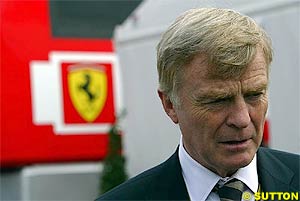 His proposals for change, due to be given formal consideration next week, on October 28th, at the forthcoming meeting of the Formula One Commission, had caused a minor panic in the paddock. In his case, it is a more important view than anyone else's, save, perhaps for that of Mr Bernard Charles Ecclestone.
His proposals for change, due to be given formal consideration next week, on October 28th, at the forthcoming meeting of the Formula One Commission, had caused a minor panic in the paddock. In his case, it is a more important view than anyone else's, save, perhaps for that of Mr Bernard Charles Ecclestone.
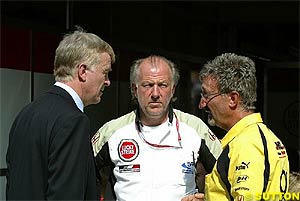 Shanghai, do not forget, is to host the Association of Tennis Professionals' (ATP) prestigious end-of-year Masters Cup showcase in November and has a series of other top-class international sports events lined up between now and the big moment, in 2008, when Beijing hosts the Olympic Games. After years of talking about the Pacific rim and the Asian tiger economies, Formula One has finally done a real deal with the big one.
Shanghai, do not forget, is to host the Association of Tennis Professionals' (ATP) prestigious end-of-year Masters Cup showcase in November and has a series of other top-class international sports events lined up between now and the big moment, in 2008, when Beijing hosts the Olympic Games. After years of talking about the Pacific rim and the Asian tiger economies, Formula One has finally done a real deal with the big one.
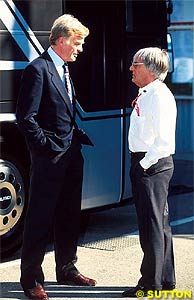 So, Max, I dared to suggest, why doesn't Formula One do what tennis does and save a few car seats (soon to be made available, possibly, by the 'big four' teams who want to run three or four car teams) for 'wild card' drivers, men (or women) entered through the local promoters' office just for a one-off race who may spice things up and provide a very unpredictable element? Perhaps they could be given a bit of a start too?
So, Max, I dared to suggest, why doesn't Formula One do what tennis does and save a few car seats (soon to be made available, possibly, by the 'big four' teams who want to run three or four car teams) for 'wild card' drivers, men (or women) entered through the local promoters' office just for a one-off race who may spice things up and provide a very unpredictable element? Perhaps they could be given a bit of a start too?
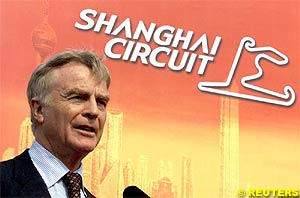 Max moved in his chair, stretching his arms to make a point. This was a point on which he felt passionate. This, also, is an emotion not given free vent in normal times (other than during the 2002 Japan-Korea World Cup soccer finals) in a strictly-conservative nation as Japan.
Max moved in his chair, stretching his arms to make a point. This was a point on which he felt passionate. This, also, is an emotion not given free vent in normal times (other than during the 2002 Japan-Korea World Cup soccer finals) in a strictly-conservative nation as Japan.
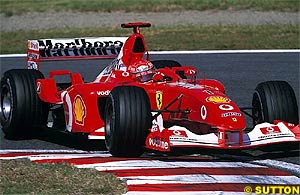 "There is a very elaborate procedure about these rule-making procedures, too, for everything except circuit safety - which is 100 percent our responsibility. All the issues with circuit safety go through us and it all checks and balances, but then this is an amazingly complex sport.
"There is a very elaborate procedure about these rule-making procedures, too, for everything except circuit safety - which is 100 percent our responsibility. All the issues with circuit safety go through us and it all checks and balances, but then this is an amazingly complex sport.
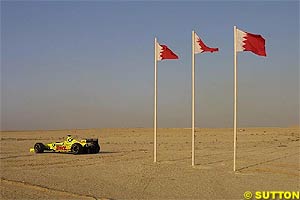 Yes, indeed. But is the all-round television package actually good enough now to stand up to comparison with, and the fierce competition from, so much other high level professional sport nowadays? "There are huge audiences in Germany and Italy," Mosley defended.
Yes, indeed. But is the all-round television package actually good enough now to stand up to comparison with, and the fierce competition from, so much other high level professional sport nowadays? "There are huge audiences in Germany and Italy," Mosley defended.
Please Contact Us for permission to republish this or any other material from Atlas F1.
|
Volume 8, Issue 43
Atlas F1 Exclusive
Max Mosley on the F1 Crisis
Is the Sky Falling?
Jo Ramirez: a Racing Man
2002 Season Review
The 2002 Race-by-Race Review
The 2002 Drivers Review
The 2002 Teams Review
The 2002 Technical Review
The Atlas F1 Top Ten
The 2002 Trivia Quiz
Columns
Bookworm Critique
Elsewhere in Racing
The Grapevine
> Homepage |